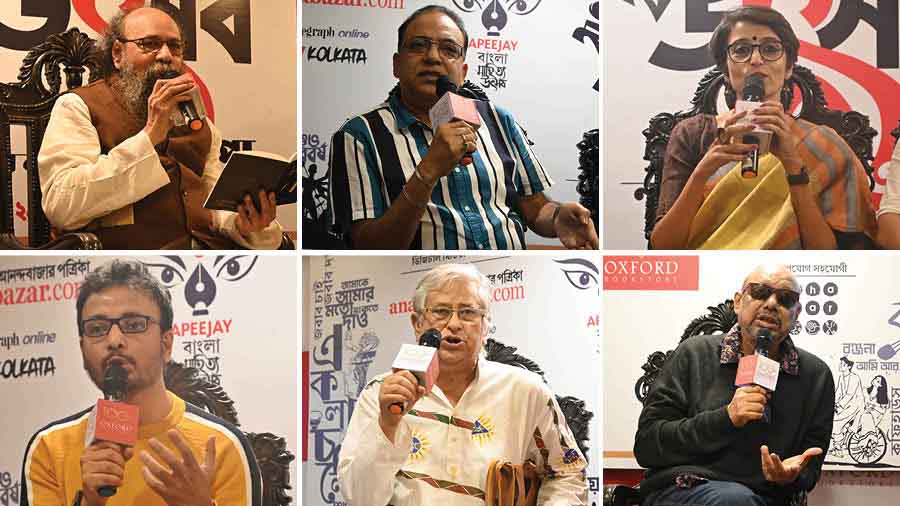The Apeejay Bangla Sahitya Utsob (ABSU) turned nine with the tagline Noy Noy Kore Noye Paa and celebrated the milestone with noted names from the Bengali literary world.
My Kolkata, digital partner of the three-day literary festival, presents glimpses from the sessions held at Oxford Bookstore, Park Street, from November 24 to 26
Highlights of the festival
The Apeejay Bangla Sahitya Utsob (ABSU) 2023 commemorated the 200th birth anniversary of Michael Madhusudan Dutt and 100 years of Sukumar Roy’s Abol Tabol. The literary festival also paid homage to legendary singers Suchitra Mitra and Kanika Bandyopadhyay.
A flag-off to remember
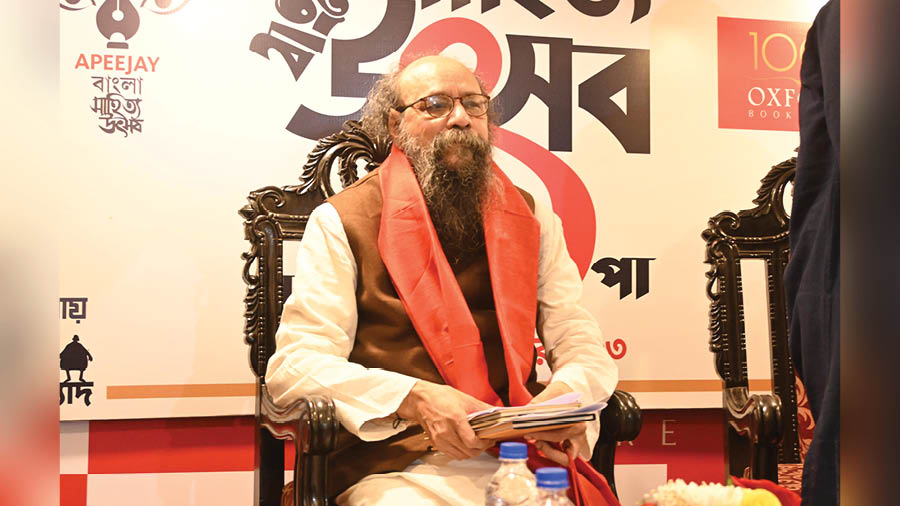
Joy Goswami was felicitated at the inauguration of the literary festival
Well-known poet and author Joy Goswami inaugurated the literary festival on November 24 in the presence of Swagat Sengupta, the festival director and CEO of Oxford Bookstores, and author Abhirup Mukhopadhyay. Reminiscing about the legacy and the mission of vision of the Apeejay literary festival, Sengupta said: ‘ABSU has consistently strived to elevate the stature of Bengali literature, providing a platform for Bengali literary enthusiasts to engage with eminent authors, scholars, and artists.’
Goswami, who was in conversation with author Abhirup Mukhopadhyay, reflected upon Bengali poetry and poets of his next generation. In an almost hour-long conversation, Goswami introspected on his path of learning after starting out as a poet at the age of 13 and read out excerpts from the works of budding poets like Tushar Biswas, Jeet Pal and by session moderator Abhirup Mukhopadhyay.
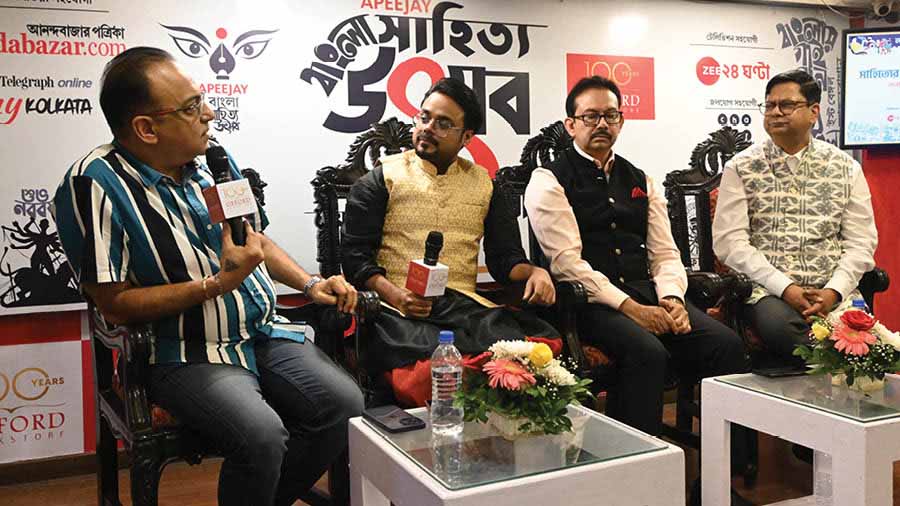
(L to R) Arindam Sil, Satyam Roy Chowdhury, Subhadeep Chakraborty and Debasish Sen
The following session titled Jonmo Twobo Bonge saw Abheek Majumdar, Debotosh Das and Shaktisadhan Mukhopadhyay discussing the life and works of Michael Madhusudan Dutta. The other two sessions on day one were Anubad Niye Badanubad and Sahityer Seemana Boier Patatei Thamena. Debasish Sen spoke about creating a settlement around literature and creating parks on literary characters like Goopy Gyne and Bagha Byne.
A literature-packed day two
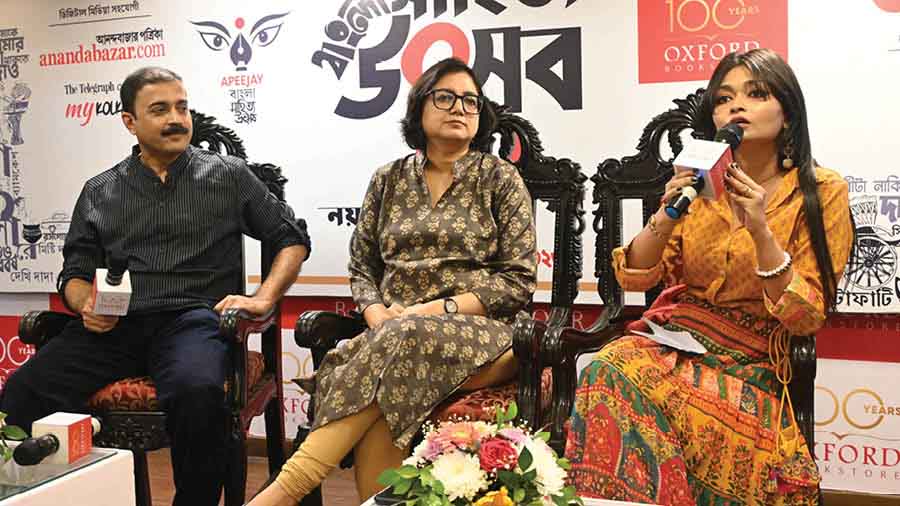
(L to R) Tanmoy Chakraborty, Aditi Basu Roy and Kasturi Sen
Sessions on day two discussed literature by budding authors, the importance of poet meets and the vast volume of literature on rural life. Popular names from the world of Bengali literature like Hamiruddin Midya, Swapnamoy Chakraborty, Nalini Bera, Kasturi Sen and Aditi Basu Roy put forward their outlooks. Basu Acharya and Soumya Basu discussed political literature in the presence of Somen Sengupta. The discussions soon took a turn towards the advent of brutality in novels and stories and love taking a back seat with Anjan Dutt, Indranil Sanyal and Nandini Nag sharing their experiences. Dutt opined: ‘Nishthurota ebong jontrona baad diye kono sahitya sombhob noy’ and later in an exclusive chat with My Kolkata on the role of violence in stories of love lost or unrequited love said: ‘Unrequited love in itself is brutal. Be it Jude the Obscure or Devdas, it was all about love and darkness. I think great stories don’t have a happy ending’.
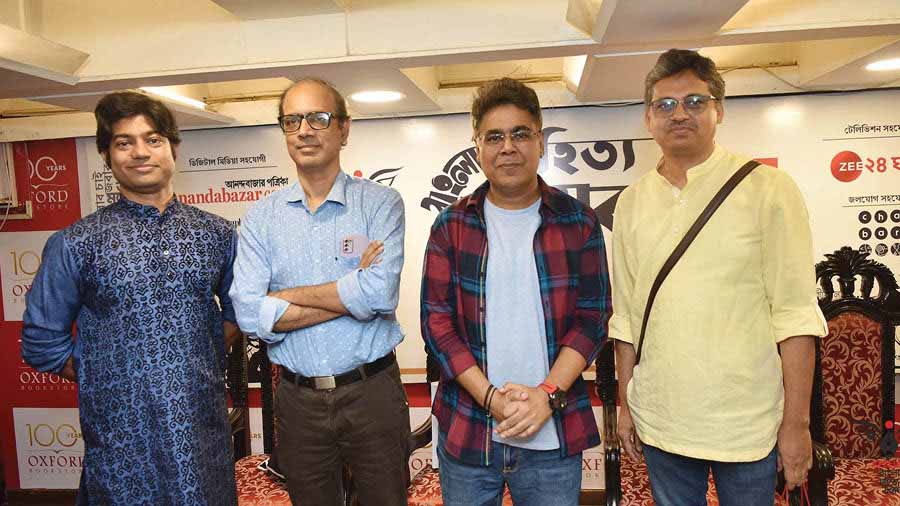
(L to R) Roy Chowdhury, Ullash Mallick, Mir and Subhankar Dey
The evenings were engaged in discussions on whether comics and graphic novels will remain to be considered as children’s literature and the gradual extinction of literary supplementaries. About literary supplementaries, author Pracheta Gupta said, ‘Samoyikpatrey mando golpo upanyaser guruttwo komche. Bhalo golpo uponyasher guruttwo obosyoi barche.’ Graphic novelist Sujog Bandyopadhyay informed the audience about working on a graphic novel on Uttam Kumar’s life.
The second day of the lit fest came to an end with Mir taking the centrestage with his take on where memes and jokes on Facebook are taking a toll on humour literature, often splitting the audience into laughter. Mir summing up with “Bangla Sahitya ba rasa sahitya ke konthasha korte pare emon meme ekhono toiri hoyni” received thundering applause from the Bengali literature aficionados in the audience. Author Ullas Mallick opined, ‘Aajker notun projonmer pochondo-opochondo jantey hasir lekhok ke jokes meme onoborot chorcha korte hobe.’ Subhankar De said, ‘Hasir golpo ekta onubhuti shristi kore, jokes kintu taa kore na.’
A promising ending to a festival to remember
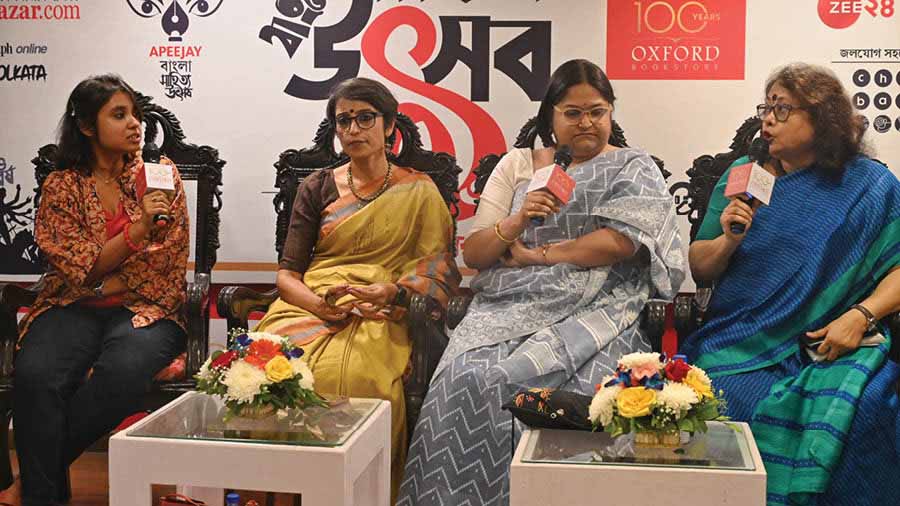
(L to R) Payel Sengupta, Dr Anuttama Banerjee, Samragnee Bandyopadhyay and Dwipannita Roy
The final day of the literary festival was a packed one, kick-starting with a quiz and then moving to discussions on science fiction and literature focusing on folklore, history and biography. During the session on science fiction, author Anusthup Sett stressed on the importance of bringing good science fiction to everyone’s notice.
A session on feminist literature with Dr Anuttama Banerjee, Samragnee Bandyopadhyay, Payel Sengupta and Dwipannita Roy focused on the history and significance of feminism. Dr Banerjee reflected on how ‘Naribaad maane purush baad diye dewa noy’. She also said, ‘Samarpan aday kora jayna, anugatyo aday kora jay.’ Author Payel Sengupta spoke about gradually working towards uprooting the prevalent stereotypes.
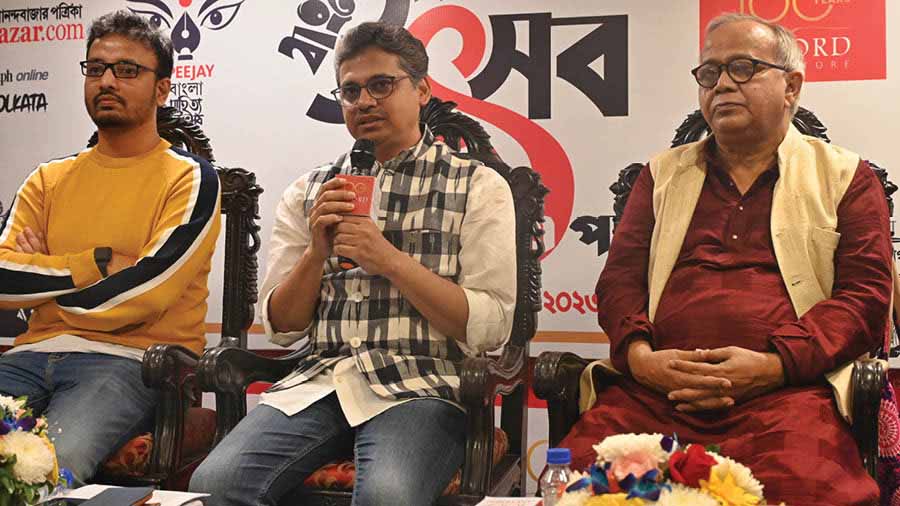
(L to R) Sadat Hossain, Subhankar Dey and Amar Mitra
Prominent author from Bangladesh, Sadat Hossain, engaged in a discussion on the past, present and future of literature in Bangladesh with Amar Mitra. Marking the centenary year of Abol Tabol, Debasish Mukhopadhyay discussed the importance of the drawings in Abol Tabol along with the poems, and how Ray wrote 130 poems in total out of which 44 are in Abol Tabol. The last discussion of the event was between Anita Agnihotri, Tapan Bandyopadhyay and Jaya Mitra on Rashtrer Roktochokkhu Bonam Sahitya Rajneeti.
